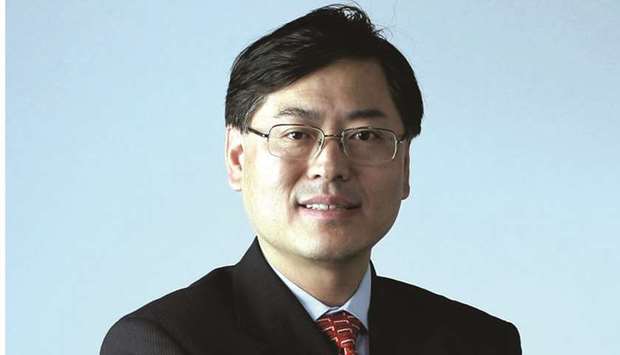Yang, who helped grow Lenovo into the world’s largest PC maker but also orchestrated the acquisitions of Motorola and IBM’s low-end server business, is now betting big on artificial intelligence. He wants to plough $1bn over the next three to four years into research, joining a race with much larger rivals Alibaba Group Holding and Tencent Holdings to crank out the next generation of intelligent, user-aware devices. Nearer term, he intends to transform the company’s sales online into an e-commerce juggernaut that can bring in 80bn yuan ($12bn) of annual revenue within three years. Yang proclaimed to conference attendees on Thursday that he hoped to do so through JD.com Inc, China’s second largest online retail service and Alibaba’s closest rival. It’s that last objective he intends to hit - or throw in the towel.
“I don’t want to step down. I’m confident we can achieve that. That’s not something worrying,” Yang said in an interview on Thursday after lifting the lid on a slew of prototype devices at Lenovo World, the company’s annual showcase. Those included a smart speaker housing the “Cava” digital assistant, a virtual reality headset, and new laptops. “Investors should have more patience. If you want to see the result, it will take time,” he added. Lenovo became the world’s largest maker of personal computers after picking up International Business Machines Corp’s PC division in 2005, a deal that heralded the arrival of Chinese Corps on the global technology scene and helped forge valuable US client relationships. Then came two successive acquisitions that, while intended to propel its entry into smartphones and datacenter servers, haven’t gone as smoothly.
Motorola has since bled smartphone market share, while Yang himself admitted Thursday that the data centre business has proven tougher than initially anticipated. Both divisions remain in the red, a significant drag on its bottom line.
Even in PCs, Lenovo narrowly lost its lead to HP Inc in the first quarter, though it managed to increase market share as industry shipments grew for the first time since 2012. Yet demand remains depressed overall and Lenovo needs to tap new sources of growth – or turn around its loss-making smartphone division. Lenovo’s re-enlisted the executive who steered the acquisition of Motorola – Liu Jun – to run its Chinese PC arm, shaking up its senior ranks to try and breathe new life into a stagnating business.
Yang is now exploring other ways to rejuvenate its core business, including a tie-up with Fujitsu Ltd Lenovo is said to be in talks to merge PC businesses with the Japanese company, but Yang would only say that both companies are working on some sort of a deal, without elaborating.
“It’s still in negotiation. If the deal’s fair, we want the deal,” he said.

